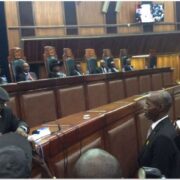Addressing Oil Spills in Nigeria: Legal Frameworks, Enforcement Challenges, and Environmental Accountability by Grace Sunday-Ayegba
Lawyard is a legal media and services platform that provides…
Introduction
Oil spills are a major environmental problem in Nigeria, especially in the Niger Delta, where much of the country’s oil exploration take place. These oil spills have serious effects on the environment including water pollution, destruction of marine life, and damage to farmland, making it unusable. Beyond environmental damage, oil spills also pose severe health risks to local communities and have negative effects on economic activities like farming and fishing, which many people depend on.
Communities exposed to oil spills often face significant health issues, such as respiratory problems and skin diseases due to exposure to toxic substances in the spills. The damage also results in social unrest, as the affected communities protest against oil companies and the government for failure to address the problem. The failure to address the consequences of oil spills often results in conflict, violence and human rights violations.
Nigeria’s legal framework for managing oil spills seeks to hold oil companies accountable for their environmental practices, but significant gaps and weak enforcement persist. Existing laws are inadequate, lacking clear standards for prevention, planning, preparedness, and cleanup. The existing legal and regulatory frameworks in Nigeria have proven insufficient in preventing and responding to oil spills. The lack of stringent enforcement and accountability allows oil spills to continue unabated.
Overview of Oil Spill Incidents in Nigeria
Nigeria has experienced numerous devastating oil spills over the years, resulting in widespread environmental and social damage. On 12 July 2012, a fuel tanker fire in Okogbe, Rivers State, killed over 200 people after the tanker swerved off the road to avoid a bad spot, leading to an explosion. In 1978, Shell faced a major spill at its Forcados Terminal when a tank failure released 580,000 barrels of oil. Two years later, Texaco’s Funiwa-5 offshore well blew out, spilling 400,000 barrels of oil. In 1998, Mobil’s Idoho platform leaked 40,000 barrels of crude oil. Shell encountered another spill in 2008 at Ikot Ada Udoh, where a capped well failed, causing oil to leak for months before it was stopped. In 2009, Agip faced spills in Kalaba, Bayelsa State, which continued for over two months, and additional leaks occurred in September 2012, remaining unchecked for a long time. Exxon also dealt with significant spills in 2010 at Ibeno, Akwa Ibom State, with two separate incidents in May and June. Additionally, in December 2011, Shell’s Bonga facility experienced a spill that released 40,000 barrels of oil into the environment. These incidents highlight the ongoing challenges Nigeria faces in preventing and managing oil spills, causing serious harm to both the environment and local communities.
Legal Framework Governing Oil Spill Management in Nigeria
1. Petroleum Act (1969)
This is the foundational legislation for the oil and gas sector in Nigeria. It provides the legal basis for the exploration and production of oil and includes provisions for environmental protection. However, it has been criticized for being outdated and insufficient in addressing modern day environmental challenges.6
2. The 1999 Constitution of the Federal Republic of Nigeria (As Amended)
Section 20 of the Constitution mandates that “The State shall protect and improve the environment and safeguard the water, air, land, forest, and wildlife of Nigeria.” Additionally, Section 17(2)(d) emphasizes that “Exploitation of human or natural resources in any form whatsoever for reasons other than the good of the community shall be prevented,” further reinforcing the commitment to environmental and community welfare.
3. National Oil Spill Detection and Response Agency Act 2006
The National Oil Spill Detection and Response Agency (NOSDRA) is the federal body responsible for responding to oil spill incidents in Nigeria, as outlined in Section 1(1) of the act. However, in practice, oil spill investigations are often led by oil company personnel, with NOSDRA typically not initiating oil spill investigations. The agency’s response is often dependent on the companies involved resulting in significant reliance on these oil companies.
4. Associated Gas Re-Injection Act (1979)
Initially passed to curb gas flaring, the Associated Gas Re-Injection Act was enacted with the aim of reducing environmental damage related to oil production.8 Under Section 3, the Act prohibited oil or gas companies from flaring associated gas after January 1, 1984, without obtaining prior written permission from the Minister of Petroleum Resources. This provision allowed the Minister to issue certificates permitting flaring only when re-injection or alternative utilization of the gas was deemed infeasible.
To reinforce compliance, Section 4 imposed penalties on violators, including the forfeiture of concessions and withholding of entitlements for companies that flared gas without authorization.
However, this Act has since been repealed by Section 310 of the Petroleum Industry Act, 2021 (PIA), which introduces new regulatory frameworks for the petroleum sector in Nigeria.
5. The Environmental Impact Assessment (EIA) Act (1992)
Section 2 of the Environmental Impact Assessment (EIA) Act mandates that an environmental impact assessment (EIA) be conducted when a proposed project or activity is likely to significantly impact the environment. Both public and private sectors are required to consider the environmental effects of any activity before proceeding. An EIA is compulsory for specific projects, including the development of oil and gas fields, construction of oil refineries, pipelines, and processing or storage facilities.
In the case of Oronto Douglas v. Shell Development Company of Nigeria Limited & 4 Ors11, the Lagos Division of the Court of Appeal addressed deficiencies in adherence to the Environmental Impact Assessment (EIA) Act. Here, the Plaintiff/Appellant, Oronto Douglas, challenged the Respondents, including Shell Petroleum Development Company of Nigeria Limited, the Nigerian National Petroleum Corporation (NNPC), Nigeria LNG Ltd., Mobil Producing (Nig.) Unlimited, and the Attorney General of the Federation, over the lack of EIA certification for the Nigeria LNG (NLNG) project. This project, classified as a mandatory study activity, involved the production of liquefied natural gas without the required EIA approval. Although Douglas was not from a community directly impacted by NLNG’s pipelines, he filed a suit seeking an injunction to halt the project until an EIA was conducted, as mandated by the EIA Act.
The trial court initially struck out his claim, citing procedural deficiencies and lack of locus standi. However, upon appeal, the Court of Appeal overturned this decision, ordering a retrial at the Federal High Court in Lagos. The appellate court held that the trial court’s decision lacked support from any material evidence, as it had determined Douglas’s lack of standing based solely on a motion on notice of preliminary objection, which was not backed by an affidavit. This case illustrates how non-compliance with EIA requirements can become a significant legal issue, underscoring the importance of procedural adherence in environmental projects.
6. Oil Pipelines Act 2004 The Oil Pipelines Act (OPA) of 2004 regulates the installation and maintenance of oil pipelines, aiming to prevent environmental harm from leaks and discharges. The Act also prohibits disrupting water flows or causing flooding and erosion without explicit permission.
Section 11 outlines the conditions under which oil pipeline licenses are granted. License holders must comply with operational standards to prevent environmental damage, and they must take necessary precautions to protect surrounding land, water bodies, and structures during installation and maintenance.
Section 14 holds pipeline operators liable for damages to land, buildings, or crops resulting from their operations. This section requires that license holders compensate affected parties for damage due to negligence or intentional acts.
Furthermore, Section 19 establishes penalties for non-compliance with the Act’s standards, which include fines and potential license revocation. This section was designed to deter negligence and ensure that companies prioritize environmental protection in their pipeline activities.
Other legislation also regulate oil pipeline activities, aiming to ensure environmental protection.
Enforcement Challenges
1. Vandalism and Sabotage
A significant challenge in addressing oil spills in Nigeria is the occurrence of vandalism and sabotage of oil infrastructure. Oil pipelines are frequently targeted to siphon crude oil, resulting in spills. These acts of sabotage involving the deliberate tampering with pipelines to siphon crude oil make it difficult for oil companies to manage and contain spills. The perpetrators often cut into pipelines or install makeshift taps, causing significant leaks. These activities not only lead to massive oil spills but also cause substantial damage to the environment and negative health impacts on nearby communities.
For instance, in 2022, the Trans-Niger Pipeline operated by Shell, a key export pipeline, became a frequent target for oil thieves, leading to multiple shutdowns due to ongoing vandalism and sabotage. These breaches resulted in significant oil spills that contaminated surrounding lands and water sources, negatively affecting local communities. Many residents accused Shell of failing to adequately protect the pipeline. The persistent vandalism forced Shell to reduce production, causing economic losses for both the company and the government. This incident highlights the difficulties faced by companies due to vandalism and highlights the severe environmental consequences of sabotage.
2. Regulatory Weaknesses
Nigeria’s regulatory bodies, including NOSDRA and the Department of Petroleum Resources (DPR), face significant challenges. These agencies struggle with inadequate funding, limited resources, and a lack of technical expertise, training, and equipment for effective inspections. Corruption within government and regulatory agencies further undermines enforcement, as bribery and collusion with oil companies often result in tax evasion, allowing companies to evade accountability for spills.
The interplay of inadequate resources, insufficient expertise, and widespread corruption has created a regulatory landscape ill-equipped to tackle the challenge of oil spillage in Nigeria. The absence of adequate enforcement mechanisms means that the oil sector continues to struggle with the effects of spills, which include significant environmental degradation and negative health effects on local communities.
To effectively safeguard the environment and ensure accountability, it is crucial to strengthen regulatory bodies through increased funding, comprehensive training for all personnel, and transparent governance.
3. Non-compliance
Many oil companies operating in Nigeria are notorious for failing to comply with environmental regulations. They often delay or avoid cleanup responsibilities, leaving communities to deal with the aftermath of oil spills. The absence of strong punitive measures allows these companies to evade their obligations without facing significant legal consequences, leading to a breakdown of public trust in both regulators and the industry. Communities affected by spills frequently express frustration and anger over the perceived neglect from oil companies and the government, which can sometimes escalate into protests.
To foster a more sustainable future for both the environment and the communities that depend on it, it is essential to hold these companies accountable and ensure prompt cleanup of spills.
4. Inadequate Fines and Sanctions
The fines imposed on oil companies for oil spills are often insufficient to compel compliance or cover the full cost of environmental remediation. In many cases, the penalties are not proportional to the scale of the environmental damage, leading companies to view fines as a cost of doing business rather than a deterrent. As a result, these companies often prefer to pay the fines rather than invest in preventive measures, thereby weakening accountability.
This issue contributes to recurring spills, further damaging the trust between oil companies, regulators, and affected communities. There is therefore a need for the revaluation of penalty structures to ensure they are substantial enough to ensure compliance.
Conclusion
In conclusion, Nigeria’s legal frameworks for managing oil spills face significant challenges, including weak enforcement, regulatory gaps, and inadequate penalties. To effectively address the environmental and social impact of oil spillage, stronger enforcement measures, accountability for oil companies, and legislative reforms are required. Without these, the country will continue to suffer from the devastating consequences of oil spills.
Lawyard is a legal media and services platform that provides enlightenment and access to legal services to members of the public (individuals and businesses) while also availing lawyers of needed information on new trends and resources in various areas of practice.












